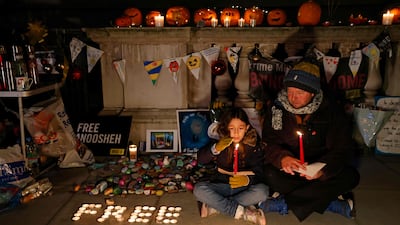The UK Foreign Office said on Tuesday that it was continuing “to explore options as a matter of urgency to resolve” the repayment of a £400 million ($542m) debt owed to Iran.
It said that the UK had always been committed to paying the debt.
On Monday, UK Foreign Secretary Liz Truss and her Iranian equivalent Hossein Amirabdollahian spoke by phone.
Ms Truss hoped Britain would soon be in a position to pay the overdue debt to Iran, Mr Amirabdollahian said.
The UK government has been exploring legal ways to pay the historical debt, as international economic sanctions on Iran have made it difficult.
With talks on the Iran nuclear deal reaching a decisive stage in Vienna, it is possible that Ms Truss wanted to stress the positives of both sides reaching a deal.
The two countries insist that the debt — dating back to the sale of tanks to the Shah of Iran in the mid-1970s — has always been independent of the Vienna talks and the fate of three British dual nationals held in Evin prison, or the detainment of Nazanin Zaghari-Ratcliffe in Iran.
However, supporters of Ms Zaghari-Ratcliffe, 43, and Anoosheh Ashoori, 67, a retired British-Iranian engineer sentenced to jail for a decade on charges of spying for Israel, say that settling the debt is a vital part of any deal to secure their release. Ms Zaghari-Ratcliffe's husband, Richard Ratcliffe, went on hunger strike for three weeks last year in protest at her detention.
Mr Amirabdollahian said the tone of the call appeared to have been warmer than for some time, with Iran eager to see the UK do more to help with the Afghan refugee crisis on its borders.
The Iranian Foreign Ministry said Ms Truss praised Tehran for housing as many as two million refugees.
“Amirabdollahian positively assessed the relations between the two countries,” the ministry said.
It may have been significant that the Irish Foreign Minister, Simon Coveney, was in Tehran on Monday. He has acted as a conciliator on political prisoner issues in the past.
In the UK parliament last month, Prime Minister Boris Johnson again blamed the threat of sanctions for the block on the payment.
The Vienna talks will mean many of sanctions could be lifted, but it has been said that the UK has been responsible for its own sanctions laws since Brexit and so could pay the debt now if it were not tied up in a wider negotiation.
Last week, Tulip Siddiq, the MP representing Ms Zaghari-Ratcliffe’s constituency in London, revealed an agreement collapsed last year that could have triggered the release of detained British citizens in Iran.
Ms Siddiq told the UK parliament that Britain had signed a deal with the regime last summer over the decades-old debt but it broke down, leaving at least four British passport holders stranded in Iran on trumped-up charges.
Ben Wallace, the UK's defence secretary, said that the main stumbling block was the UK had to uphold its obligations over the debt.
“We also have international law obligations around sanctions and that makes how we hand back that money very difficult while Iran is in breach of all sorts of obligations, and indeed engaged in malign activity around the Middle East,” he said.









